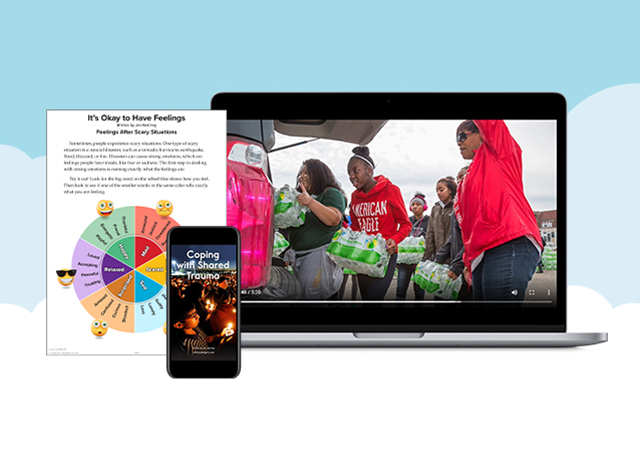Social-Emotional Learning (SEL) In the Classroom
Relationships are central to the human experience, and this truth is especially evident throughout children’s formative years and their time spent in school. If you ask an adult to recall what they remember about school, you’ll almost invariably hear about the people in their life and how the they’ve had with those people helped shape their personal identity. Research tells us that a student's beliefs about their identity, competence, and odds of being successful influence their interest in, and aptitude for, certain academic subjects. While academic achievement is important for later successes, so are the positive emotions and skills that support all areas of student development. One of the main contributing factors to emotional development is Social-Emotional Learning (SEL), the process in which adolescents and adults acquire the skills to manage emotions, develop a sense of identity, and feel and show empathy for others. As you begin to consider how best to implement a Social-Emotional Learning curriculum in your classroom, we’d like to provide you a little more information.
What is Social-Emotional Learning?
To expand upon the aforementioned definition of Social-Emotional Learning (SEL), SEL can be understood as a developmental process through which individuals learn to recognize and manage emotions, set and achieve positive goals, feel and show empathy for others, establish and maintain positive relationships, and make responsible decisions. Educators can facilitate this process by focusing on any or all of the following five SEL competencies in their content instruction:
- Self-awareness
- Self-management
- Social awareness
- Relationship skills
- Responsible decision-making
Considerable evidence shows that people with strong social-emotional skills benefit academically, socially, and professionally, and are better at coping with challenges. SEL can provide the foundation for positive long-term effects on students, caregivers, teachers, schools, and communities and can form the foundation for culturally responsive teaching methods.
Why is Social-Emotional Learning Important?
Social-Emotional Learning is a tool that truly allows all students to enjoy a comfortable, productive learning environment, as it involves creating an understanding of the issues students face from different walks of life and a cognizance of self. As students learn about the concept of empathy and apply it to other students, a foundation of understanding and acceptance is built.
In turn, SEL has the power to reduce bullying, help students become more socially developed, increase self-awareness, and produce higher levels of academic success.
Social-Emotional Learning Activities
If you are a classroom teacher, you might wholeheartedly agree that SEL competencies are necessary for student success, but you might also be wondering how to teach students to become more self-aware and manage their emotions effectively. In general, certain instructional practices can elicit and engage students in SEL by focusing class discussions, activities, and assignments on thoughts, feelings, and behaviors, while situating such discussions in context. Here are a few samples of practices that you can adopt to align with Social-Emotional Learning competencies:
Reflection: You can help students develop social-emotional competence by providing them with frequent opportunities to reflect on both the content (e.g., What went well? What was challenging? How does it apply outside the classroom?) and the experience of learning something new (e.g., What did they like and dislike? How did they feel?). This can be done in a variety of ways, including class discussion, journaling, or quick check-ins.
Feedback: Provide frequent supportive, authentic feedback that focuses on the skills and effort students display by stating things such as “You did a nice job sounding that out,” or “I’m glad that you asked that clarifying question.” Providing praise for these aspects rather than for personal attributes helps students develop SEL and allows them to view a model of how they can provide supportive feedback to their peers as well.
Check-ins: You can help students set small and large goals for themselves and check in with them regularly to assess progress. Examples of Social-Emotional Learning goals include the ability to use positive self-talk, anticipate consequences, evaluate outcomes, etc. Integrating SEL goals and competencies can be done across the academic curriculum in a range of content areas. The ways in which SEL competencies can be enacted will depend on your preferences and the needs of your students.
The Takeaway
The key to fostering Social-Emotional Learning is first helping students understand why these competencies are important and then continuously showing students how SEL can effectively promote better relationships and improved academic achievement. Create ample opportunities for students to practice these skills, and provide feedback and time for reflection. Fostering a sense of safety, trust, and caring in the classroom can help nurture and sustain lifelong learning for each and every one of your students.
Adopting an SEL Curriculum
Need a little help getting started? We have you covered! Available with a subscription to Raz-Plus, Meaningful Conversations acts as the perfect companion to develop key Social-Emotional Learning skills such as self-awareness, self-management, social awareness, relationship skills, and responsible decision-making. Delivering culturally responsive content in multiple formats, Meaningful Conversations provides all of the resources teachers need to guide age-appropriate, inclusive, respectful discussion about a variety of topics that influence the modern day classroom.
- Deliver highly engaging, multi-format materials for students
- Access full instructional support
- Guide age-appropriate, inclusive, and respectful discussions
- Help students develop SEL competencies
Sign up for a Free Trial of Raz-Plus today!
Access the plethora of engaging SEL resources with
Meaningful Conversations, an add-on to Raz-Plus.

GET FREE ACCESS


